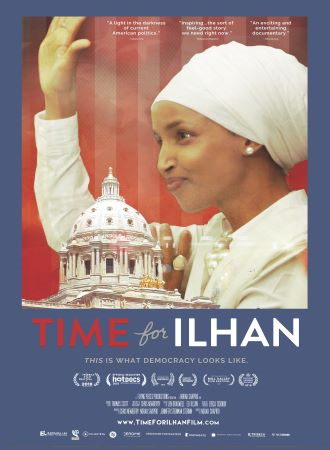
Time for Ilhan 2018
Distributed by Good Docs
Produced by Norah Shapiro, Jennifer Steinman, Chris Newberry
Directed by Norah Shapiro
Streaming, 61 mins
High School - General Adult
History; Political Science; Race Relations
Date Entered: 10/31/2019
Reviewed by Ciara Healy, Librarian for Psychology and Neuroscience, Duke UniversityThe film Time for Ilhan is a close observation of Ilhan Omar’s campaign for Minnesota’s State representative from Minneapolis’ District 60B in the 5th congressional district. Filmmaker Norah Shapiro follows Omar from her early door-to door campaigning and leafleting to her ultimate election as MN state representative in the US House. Omar describes herself in the film as a community organizer, educator, a Somali woman, a Muslim and an immigrant, or a “new American” as she describes immigrants, a feminist and as a refugee fleeing Somalia for a refugee camp in Kenya. From that refugee camp, her family was sponsored to come to the US.
She was encouraged by her community - women, Somalis, students, progressive voters and her party, the Democratic-Farmer-Labor (DFL) Party – to run. Interestingly, she ran against an incumbent candidate who has held the seat for the district for 43 years – Phyllis Kahn. In addition, she was running against another Somali candidate Mahmood Noor, who had the advantage as a man by being seen as a breadwinner, hence a higher status among Somali voters, especially the older members of the community. In the Minneapolis Somali community, the vote could have been split or favored Noor. The issues Ilhan runs on include environmental justice/fossil fuels, mass incarceration, and other disparity gaps.
Ilhan addresses her own internalized trepidation, “voices in my head telling me I can’t’” as well racist remarks by opponent Kahn, such as “Omar’s head scarves get silkier, her jeans tighter and her skin lighter” indicating either her increased assimilation into white US culture or an increasing distance from her mostly Muslim, Somali community roots - or both. In the film, Patricia Torres Ray, MN State Senator notes more broadly that the movement to have more women run for office has as a built-in backlash – too young, too inexperienced - which Khan levels against Ilhan.
As we know, Ilhan won her party’s seat over Khan and Noor and was elected to the US House of Representatives. The film focuses on the grassroots aspects of her campaign, as well as her internal and competitive struggles in the DFL party, which ran three candidates (Khan, Noor, Omar) unopposed by a Republican candidate. The scenes in which she sees that the number of delegate votes needed to make her the district representative are emotional and triumphant. Reader, I cried.
Overall, however, this is not a groundbreaking film, rather, a groundbreaking run for Ilhan told in a sympathetic light. The film shows the mostly agreeable, meritocratic sides of Ilhan, apart from one scene in which, prior to the 5th vote at the DLF Party delegate convention, Ilhan is speaking to Noor in a mix of heated Somali and English, reminding him of his promise to rally his delegates on her behalf so as to beat Kahn. While far from a “puff piece” the documentary does present her campaign as one that is wholesome, skews young and idealistic and in some places illustrates a difficult, uphill and ultimately triumphant political battle.
Awards
Award for Outstanding Directing Special Class - Daytime Emmy Creative Arts Awards; HBO Audience Award Feature Documentary - Provincetown Film Festival and other nominations and awards.